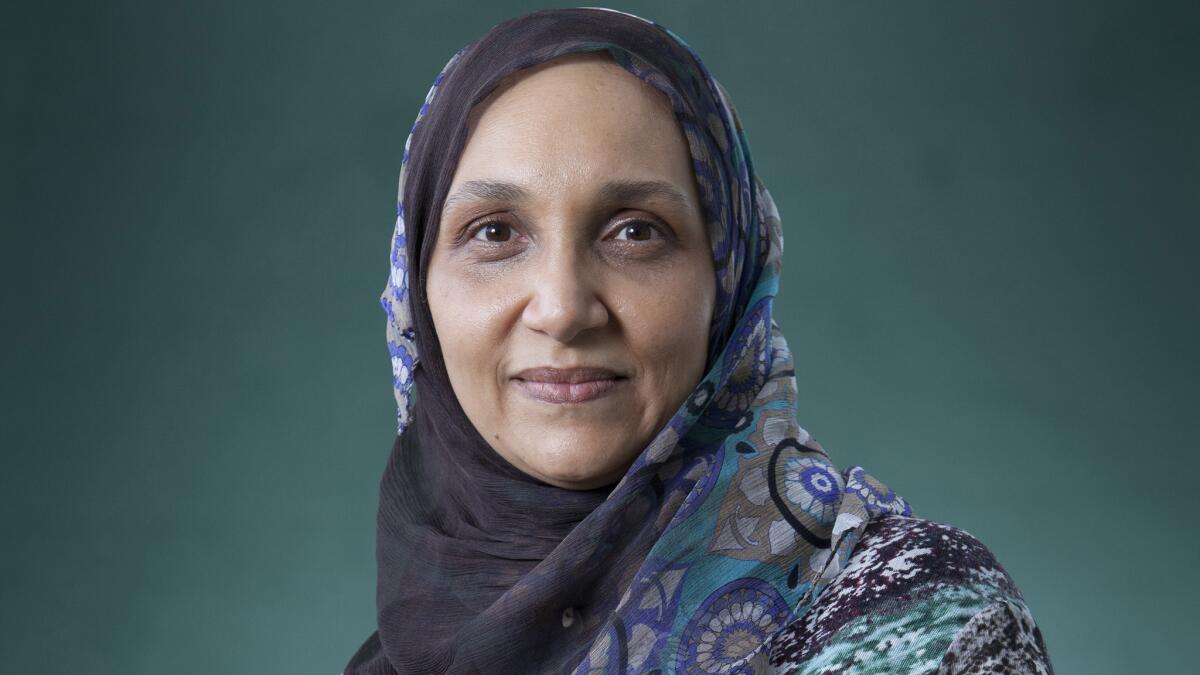Review: A Muslim woman struggles with identity in the novel ‘The Kindness of Enemies’ by Leila Aboulela

Sudanese writer Leila Aboulela.
- Share via
Award-winning Sudanese writer Leila Aboulela was born in Cairo and raised in Khartoum, Sudan, a place that features prominently throughout her work, along with issues surrounding Muslim culture, religion and assimilation. The daughter of an Egyptian mother and a Sudanese father, Aboulela earned an economics degree from Khartoum University and a masters from the London School of Economics. She later settled with her family in Scotland, where her fourth novel, “The Kindness of Enemies,” begins.
It’s Scotland in 2010, and Natasha, a half-Sudanese, half-Russian professor of history, is researching the life of religious leader Imam Shamil, who led the charge for Caucasian Muslims during their 19th century fight to gain liberation from the Russians.
Although accomplished and bright, Natasha, whose late mother was Russian and whose estranged father is Sudanese, clearly struggles deeply with a sense of disconnect and duality about her identity and place. Born Natasha Hussein, she changes her name to Natasha Wilson to try to blend in to a place where neither of her parents felt at home.
Early on, Natasha describes her eagerness and that of other Muslim youth in Britain to erase their Muslim identities: “Many of the young Muslims I taught throughout the years couldn’t wait to bury their dark, badly dressed immigrant parents who never understood what was happening around them or even took an interest.... I was actually one of the lucky ones. I was one of the ones who saw the signs early on in the tricksy ways of schoolchildren, in the way my mother, snow-white as she was, was disliked for being Russian. I saw the writing on the wall and I was not too proud to take a short-cut to the exit.”
She becomes an accomplished and prolific academic at a respectable university, and, as Dr. Wilson, gives lectures with titles like “Jihad as Resistance — Russian Imperial Expansion and Insurrection in the Caucasus.”
Aboulela leaves Natasha behind to create a fiction about the subject of her work — the 19th century war between Caucasus Muslims and Tsarist Russia. The novel is told through these distinctly different perspectives, tied by a single character: Imam Shamil of 1850s Dagestan, and his descendant, Natasha’s excellent student Oz.
Oz — short for Osama — invites his professor to meet his actress mother, Malak, at her farmhouse in the country, where they have Shamil’s legendary sword on display. Malak, a charismatic modern woman and a practicing Muslim, openly and proudly argues with her son about the differences between Shamil’s order of jihad and those of Al Qaeda.
Natasha listens and observes and is drawn in both by the relationship between mother and son and the unfamiliar sense of kinship their generosity and ease of curiosity provide. “I was captivated by the combination of Oz, Malak and their isolated sandstone house. I did not feel that I could outgrow them, that our conversations would go stale or that I would tire of their company. Perhaps it was because I started to search for traces of Shamil in them.”
The traces she finds come alive in ways jarring and extraordinary, starting with the racial profiling and arrest of Oz, who was seen by neighbors wielding Shamil’s sword in the front yard and assumed to be a terrorist.
We get to meet Shamil, his family and rivals in semi-alternating chapters set during the 1800s. There are important characters on both sides of the conflict: Shamil and his son, Jamaleldin, versus Anna, Princess of Georgia, wife of a Russian military commander who has insisted on summering in their Tsinondali estate, despite fear of invasion by the Caucasus highlanders and rumors that “Shamil is a monster who eats Russian flesh.”
The writing in these chapters, which take us to Dargo, the Caucasus, Georgia/Dagestan, St. Petersburg, and Warsaw, is almost euphoric — language swept up in a ministry of dreamstate, imagination and the romance of favored consciousness: “At the mention of his father [Shamil], Jamaleldin felt as if he was forced to put on his best woollen coat in the height of summer. Shamil was not for him now; he was a legendary name, a lost love, as close and as far as an organ inside Jamaleldin’s own body, deadly to reach.”
The relationship between father and son is oddly symbiotic to the less loving relationship between Natasha and her own father, a staunchly religious Muslim who abandoned her when he split from her mother and stayed in Khartoum, while Natasha moved to Scotland with her mother and new stepfather.
Back in Scotland, Natasha receives word from Khartoum that her father has fallen gravely ill. She is beckoned to his bedside by childhood friends. Later he tells her over the phone that he regrets not having fought harder to keep her with him: “I’m telling you it’s a mistake. The biggest mistake. You see because you were her daughter. I couldn’t stand even looking at you. That was when I made the wrong decision.”
She can barely stand to listen to what her father is saying — perhaps because she knows it’s the truth. His approval meant something to her as a young girl, and Natasha still longs for it. And not just his approval as a father but as a Muslim, even if she is not entirely sure how to be one — in a mosque she visits with Malak during a layover in London on her way to see her father in Khartoum, she finds herself steadily inching away from the prayer circle until she is at the back of the room against the wall. Perhaps this is a way to demonstrate her freedom as a conflicted Muslim woman, who doesn’t have to behave like a Muslim woman, or the opposite — a Muslim woman ceding her power at the center of religious service, making herself unseen.
Natasha also had a fraught, achingly close relationship with her mother, who has died: “She had yellow shoulder-length hair, but near her neck the hair was darker. And her eyebrows too, which she plucked diligently, were darker. My own hair was different — it was like my father’s even though I was a girl and it should have been like hers; instead it was a mistake, a bush to touch and in photographs, a cloud. Like other white mothers with black daughters, my mother had no clue how to deal with it. It left her bewildered and helpless, it made her feel incompetent.” This is an example of many riveting, almost suffocatingly intimate moments when we are with Natasha in the near present. I wish Aboulela stayed longer with them, took us further in them.
But the main thrust of this book is written from and about a historian’s perspective. It’s about the wish and murmur of lives lived centuries ago — what they tell us and how we exalt them, long for them, look to them to make our existence sufferable and better still, interesting.
There is a tremendous amount going on in “The Kindness of Enemies” — but it does not crowd the reader. Rather, it hums in hushed and meditative tones through prisoners of war in historic and contemporary fantasy rooted in reality.
::
The Kindness of Enemies
Leila Aboulela
Grove Atlantic: 320 pp., $25
Carroll is the author of five books, including “Saving the Race: Conversations on Du Bois From a Collective Memoir of Souls.”
More to Read
Sign up for our Book Club newsletter
Get the latest news, events and more from the Los Angeles Times Book Club, and help us get L.A. reading and talking.
You may occasionally receive promotional content from the Los Angeles Times.











